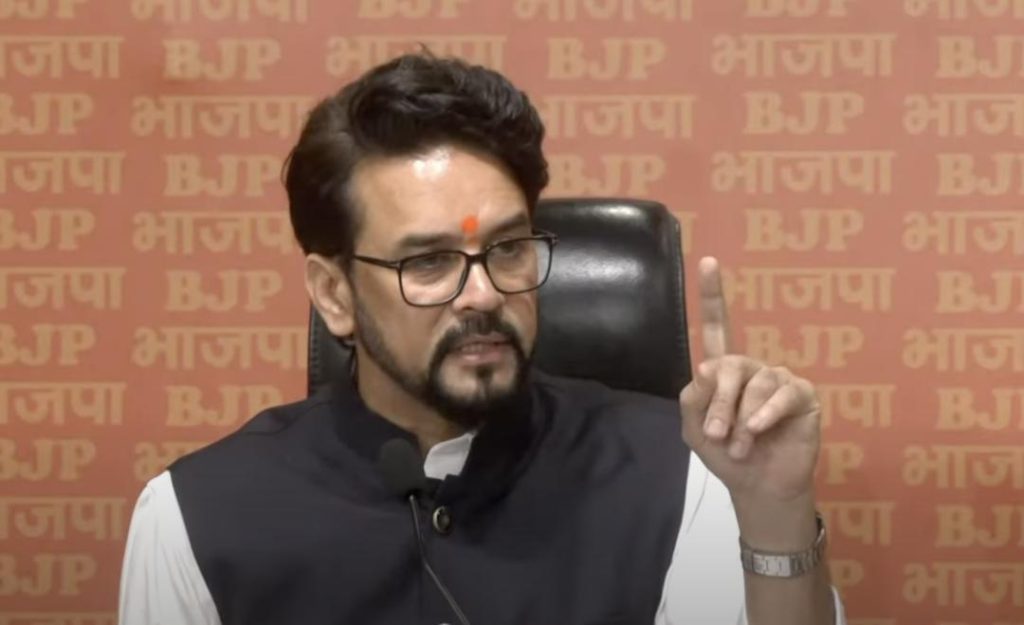
Congress & CPI made Bhimrao Ambedkar lose the poll in 1952: BJP
In a shocking revelation, BJP MP Anurag Thakur recently claimed that the Congress and Communist Party of India (CPI) jointly conspired to defeat Dr. Bhimrao Ambedkar, the chief architect of the Indian Constitution, in the 1952 elections. This startling accusation has sent shockwaves across the political spectrum, with many questioning the validity of this claim.
According to Thakur, the Congress and CPI, in a bid to eliminate Ambedkar, a prominent Dalit leader, from the political scene, masterminded a plan to reject a significant number of votes, ultimately leading to his defeat. The BJP MP made these assertions while addressing a rally in Pune, where he claimed that the Congress laid the foundation of electoral corruption in the very first election of 1952.
Thakur’s allegations are based on the fact that a staggering 74,333 votes were rejected in the 1952 election, which he believes was a deliberate attempt by the Congress and CPI to disenfranchise Ambedkar’s supporters. Ambedkar, who was a member of the Indian Parliament at the time, was contesting the election from the Bombay South constituency.
The Congress and CPI’s alleged sabotage of Ambedkar’s chances can be seen as a stab in the back for a leader who played a pivotal role in shaping India’s constitutional framework. Ambedkar was not only a brilliant jurist and economist but also a champion of social justice and equality, particularly for the Dalit community.
Thakur’s statement has sparked a heated debate about the role of the Congress and CPI in the 1952 election. While some have praised Ambedkar’s contributions to the country, others have questioned the validity of Thakur’s claims, citing the lack of concrete evidence to support his assertions.
In his address, Thakur also highlighted the Congress’s alleged history of electoral malpractices, stating that the party’s modus operandi has remained unchanged over the years. He claimed that the Congress has consistently used its power and influence to silence opposition voices and manipulate electoral outcomes.
Thakur’s remarks have been met with a mix of reactions from various political quarters. While some have endorsed his views, others have dismissed them as baseless and motivated by political expediency.
Critics of Thakur’s statement have pointed out that there is no concrete evidence to support his claims, and that the rejection of 74,333 votes was a common phenomenon in the 1952 election. They have also questioned the motives behind Thakur’s sudden decision to highlight Ambedkar’s defeat, arguing that it is a calculated attempt to garner political mileage.
On the other hand, supporters of Thakur’s statement have hailed his bravery in speaking truth to power and highlighting the Congress’s alleged role in Ambedkar’s defeat. They have argued that Thakur’s remarks are a testament to the BJP’s commitment to upholding the values of social justice and equality that Ambedkar championed.
The controversy surrounding Thakur’s statement has reignited the debate about the Congress’s role in Indian politics, particularly with regards to its treatment of marginalized communities. As the country continues to grapple with issues of social and economic inequality, Thakur’s remarks serve as a stark reminder of the need for accountability and transparency in political affairs.
In conclusion, while Thakur’s statement has sparked a heated debate, it is essential to acknowledge the significance of Ambedkar’s contributions to Indian society and politics. His legacy continues to inspire countless individuals and communities, and his ideals of social justice and equality remain as relevant today as they were during his lifetime.
Source: https://youtu.be/0kLyW5rSJSg






